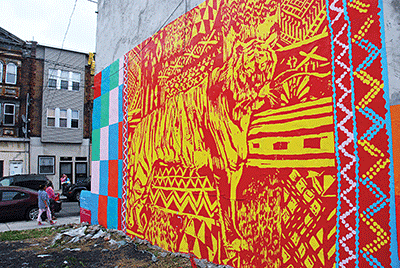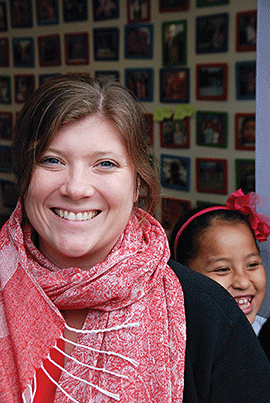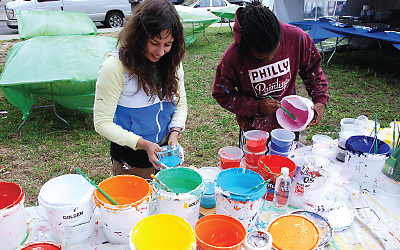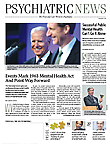Mental health is up against the wall in Philadelphia.
The city’s Porch Light Program uses mural painting as one tool to strengthen community bonds and improve the life of Philadelphia’s immigrants. Support for the collaborative initiative comes from both the city’s mural-arts program and its Department of Behavioral Health and Intellectual disAbility Services (DBHIDS).
Porch Light (it “symbolizes warmth and security”) is not a clinical program, although its role in developing community cohesion and resilience may indeed be therapeutic. Its primary goal is to draw individual immigrants together, often in places like the storefront that houses Southeast by Southeast in South Philadelphia. Artists employed by the city work with them to design and paint walls in the neighborhood.
A presentation about Porch Light and a tour of area murals were cosponsored by APA’s OMNA on Tour project the day before the Institute on Psychiatric Services began in Philadelphia in October. OMNA on Tour is a program of the APA Office of Minority and National Affairs.
The murals and other activities in the city’s community centers benefit refugees from Iraq, the Democratic Republic of the Congo, Nepal, Burma, and Bhutan who may have been on the run or living in camps for years, said Melissa Fogg, M.S.W., a DBHIDS immigrant mental health specialist. “Talking about their trauma is hard for them.”
Fogg and Ellen Plumb, M.D., have also used a program called PhotoVoice to take pictures and then discuss their observations.
“The participants become visual anthropologists in their own communities,” said Plumb, a faculty development and primary care research fellow in the Department of Family and Community Medicine at Thomas Jefferson University. “But it also links needs assessment with community participation.”
Discussing their photos reveals differences among the immigrant groups in their responses to migration and resettlement. For instance, the Burmese appreciate the educational opportunities and the greater cultural freedom available for individuals in the United States, while the Iraqis tend to focus on their sense of loss caused by their displacement.
The photographs also reveal disappointments, such as the lack of snow-capped mountains in Philadelphia or the presence of too much trash on the city’s streets.
“Trash is a strong mental health stressor,” said Plumb, who runs a refugee clinic staffed by medical residents. More than 800 refugees have received physical exams and psychological evaluations there since 2007.
“We changed the way we approach mental health in primary care, and so we talk to these patients differently from the way we would to American-born patients,” said Plumb.
Of course, clinic physicians inquire about infectious diseases and other general medical problems, but they also ask why patient became refugees. Who was left behind? Who or what do they miss about their home country or village? The answers may provide insight into possible trauma or extended deprivation that the refugees experienced.
“This tells us much more than ‘How are you sleeping?’ and starts a more productive conversation,” Plumb noted. “Family and community are very important to them.”
Drop-in storefronts such as Southeast by Southeast reduce isolation, provide a community connection in a safe space, and let the immigrants embrace their cultural heritage, she explained. “It’s an empowering place because it’s their space. They have a voice.”
That growing sense of community and safety also helps break down cultural stigma that may surround mental health issues and eases the connection to treatment for those who need it, said Fogg. The approach seems to be working.
“This is a special place for our community,” said Naw Doh, a neighborhood Burmese leader. “It gives us an opportunity to dream something new.” ■



